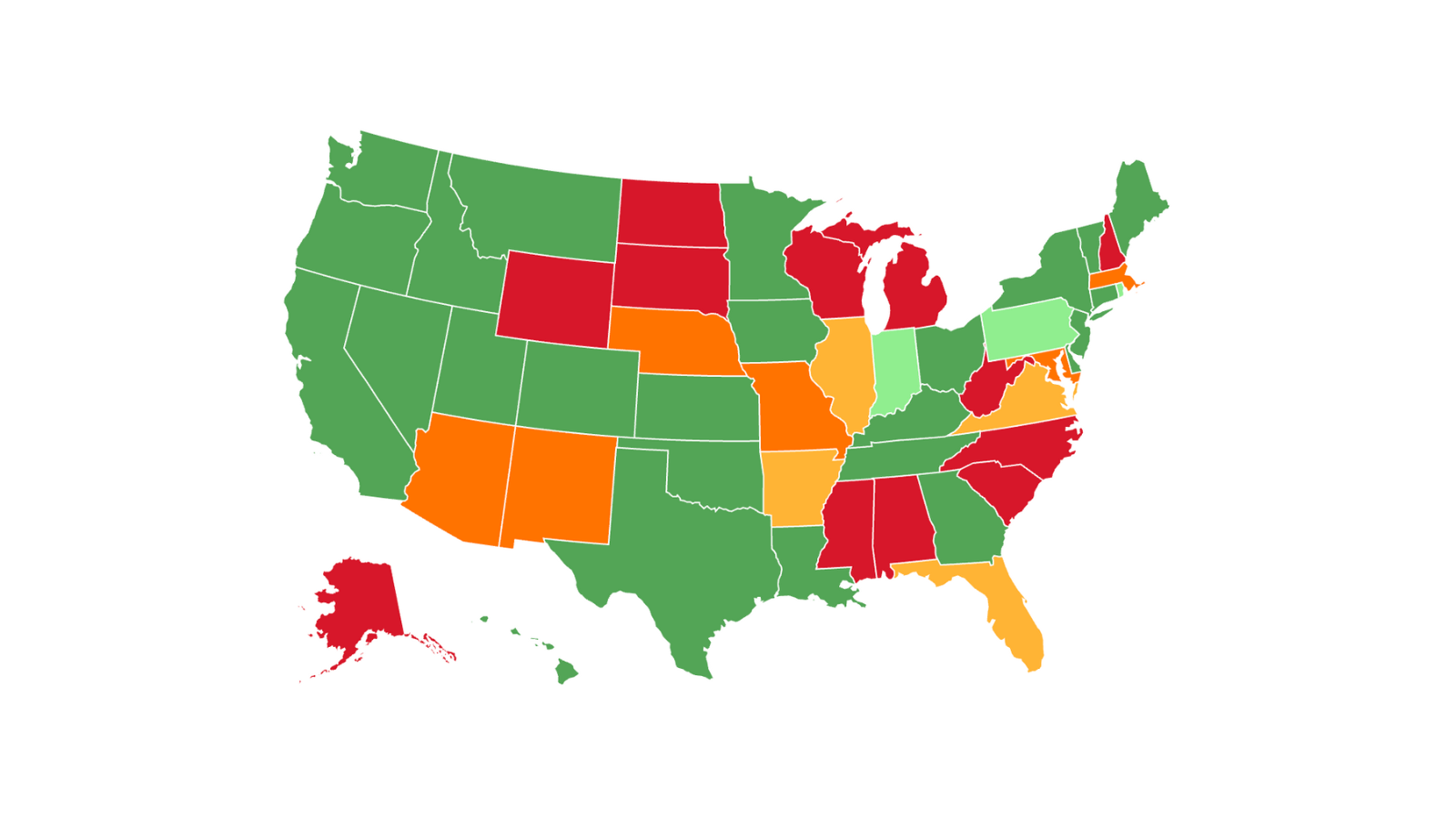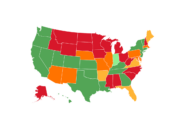Washington, D.C. – In just seven years, the number of Americans protected by strong laws against abusive litigation designed to silence speech has soared by 83%—yet at least 12 states still offer their residents no protection at all.
Those are some of the top-line findings in the new 2025 Anti-SLAPP Report Card, just released by the Institute for Free Speech.
The report reveals that state laws protecting against costly, meritless, speech-suppressing lawsuits are growing and improving nationwide, now covering 37 states plus the District of Columbia. Delaware is expected to soon become the 38th state after its legislature unanimously passed a bill that the governor is expected to sign. The report details and rates state-by-state legal protections against “SLAPP” suits, which stands for “strategic lawsuit against public participation.”
Unscrupulous plaintiffs abuse the legal system by using SLAPPs to punish or prevent speakers from exercising their First Amendment rights, suppressing, punishing, or chilling speech that the plaintiff doesn’t like. Such a litigant typically claims that the speech constitutes defamation, suing speakers to harass or silence them, or punish them by forcing them to bear significant litigation costs.
For the first time, nearly 63% of Americans have good anti-SLAPP protection in state courts, meaning a “B” grade or better on the Institute’s scale, and over half of citizens are protected by an “A”-graded law. Yet, many states lag behind, with weak laws or no laws protecting their citizens from such suits, putting those Americans’ rights to speak or publish at significant risk.
Anti-SLAPP statutes protect against these suits, but the strength of those protections varies widely from state to state. Thankfully, the Institute’s new report shows a trend toward more and stronger anti-SLAPP laws. Key points in the report include:
- For the first time, a majority of the country’s population (56%) enjoys the protection of a law with an “A” grade on the Institute’s rating scale
- In all, 25 states now have some form of “A” grade (including Delaware)
- Also for the first time, nearly 63% of the American population resides in a jurisdiction with a good anti-SLAPP law, meaning a grade of “B” or better
- The number of states with “B” grade or better laws in 2018 was just 12. Today, there are 28 such states (including Delaware). That represents a 133% increase
- 86.2% of the American population is now covered by some kind of anti-SLAPP law, yet another record high
- Since the 2023 report, ten states have raised their anti-SLAPP scores by adopting or improving laws, including Ohio, Minnesota, Pennsylvania, and, most recently, Illinois. (Includes Delaware)
- Despite political polarization, these new speech-protective laws usually pass with overwhelming bipartisan support that is often unanimous
- Three states plus D.C. fall in the “B” range
- Four states have “C” grades
These excellent results are part of a remarkable positive trend over the past several years. Since 2019 alone, the percentage of Americans protected by an “A” law has climbed from less than 35% to the majority we see today. As recently as 2012, less than half the population had any anti-SLAPP protection whatsoever. By contrast, more than five in six Americans enjoy at least some form of anti-SLAPP law today.
Those figures represent a tremendous success. Despite this positive trend, however, millions of Americans still live in states that woefully lag behind. Six states have a grade in the “D” range, while 12 states receive “F” grades for having no anti-SLAPP law. This disparity leaves them to endure meritless, speech-suppressing lawsuits without the essential legal protections enjoyed by most of their fellow Americans.
One key catalyst for improvement has been the respected and nonpartisan Uniform Law Commission announcing its model anti-SLAPP law, the Uniform Public Expression Protection Act (UPEPA), in 2020 after many legislatures had adjourned that year. This model law has already helped lead to excellent new or revised laws in twelve states (including Delaware) since the 2022 version of the Report Card.
“The pace of continued progress in protecting more and more Americans’ free speech rights is astonishing. Yet, there are still far too many states in which wealthy plaintiffs can silence critics with the threat of financial ruin,” said Institute for Free Speech President David Keating, also one of the report’s co-authors, along with Helen Knowles-Gardner and Dan Greenberg. “States can easily fix this problem by enacting strong anti-SLAPP laws. These laws are one of the most effective tools available to protect free speech, and every state should adopt one that covers all speech about matters of public concern.”
Indeed, one of the failures of many weak anti-SLAPP statutes is a limitation on the type of speech covered. Five of the six states with “D” grades would rise to at least a “B-” by using UPEPA’s definition of protected speech, and one would rise to “C+.”
The wide range of beneficiaries of robust anti-SLAPP laws demonstrates how important such laws are for protecting free speech in myriad contexts. Anti-SLAPP laws have helped protect the speech rights of journalists, environmental activists, citizens speaking at government meetings, conservative Christians, Hollywood filmmakers, scientists, people leaving Yelp reviews, people who post on social media, podcasters, anti-abortion groups, labor unions, public officials, community advocates, and more.
The broad impact of SLAPPs, punishing and suppressing speakers of all kinds, is one reason strong anti-SLAPP laws usually enjoy overwhelming and often unanimous bipartisan support when adopted.
“The recent wave of states adopting stronger anti-SLAPP laws shows that lawmakers increasingly recognize the importance of protecting their constituents from these dangerous lawsuits,” said Institute for Free Speech Research Director and report co-author Helen Knowles-Gardner. “Now the remaining states should catch up and provide their residents with these essential legal protections.”
Keating added, “The two biggest gaps left in protection against SLAPPs are the states with weak or no laws and the lack of a federal anti-SLAPP statute. Even in states that have adopted strong anti-SLAPP laws, large portions or sometimes all of a state’s laws often don’t apply in federal court. A federal law is also needed to prevent deep-pocketed censors from using lawfare in federal court. We hope that the remaining ‘D’ and ‘F’ states will soon adopt strong laws, and that Congress will also move quickly to pass an anti-SLAPP law that provides an essential safeguard for free expression.”
The full report, including a detailed breakdown of each state’s laws and accompanying score, is available here. It covers laws enacted or bills unanimously approved by a legislature before August 22, 2025.
Note that the Delaware score and grade reflected in the report are based on a bill that unanimously passed the legislature but, as of this writing, has not yet been signed by the governor. We anticipate that this will happen soon. If the governor does not sign or veto the bill within 10 days after receiving it, the bill becomes law without his signature.
About the Institute for Free Speech
The Institute for Free Speech promotes and defends the political speech rights to freely speak, assemble, publish, and petition the government guaranteed by the First Amendment.














